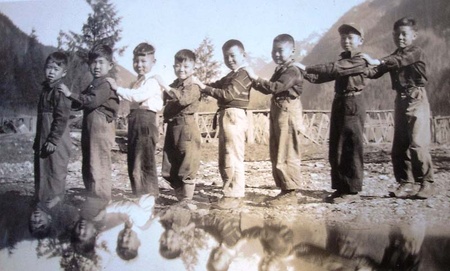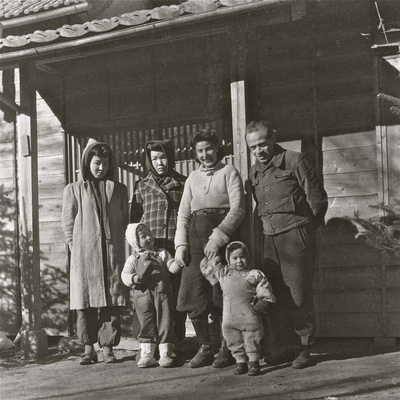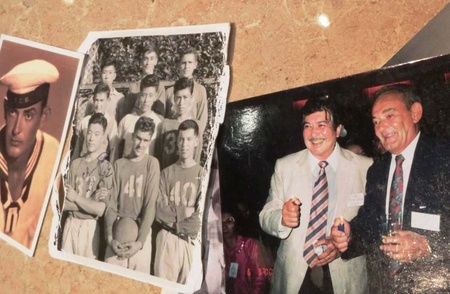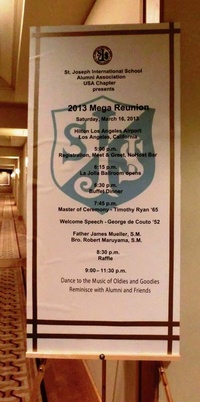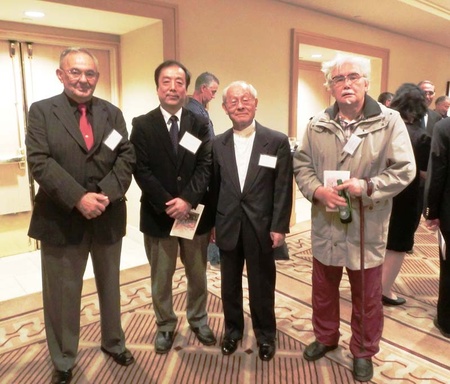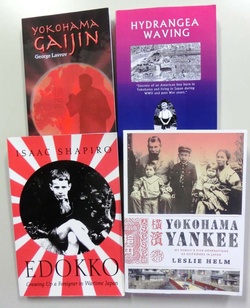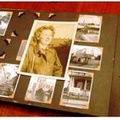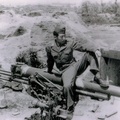横浜山手には明治期以来、いくつものインターナショナルスクールがある。あるいはあった。日本最古といわれるサンモール(St. Maur、創立1872年、山手83)、横浜インターナショナル(YIS、1924年、同258)、惜しまれながら2000年廃校になったセントジョセフカレッジ(SJCのちSJIS、1901年、同43)などのスクールである。
ここには日本人子弟も一部在籍したが、横浜や東京に居住した外国人子弟が中心である。様々な国籍の家庭に育った生徒からなり日本語の使用を禁じた学校生活はきわめて国際色豊かなもので、卒業後の彼らの進路は世界に広がっている。横浜のインターナショナルスクールに通った人々の家族史は国際港都横浜の典型的な一面を表すものである。
ある出会いから
昨年2月下旬、カリフォルニア州北部のカーメルを観光で友人たちと歩いていたときのことである。交差点で地図を広げて道を捜していると親切な年配のアメリカ人夫妻が話しかけてきた。横浜から来たというと「私は40年間山手60番に住んでいた」との返事。そのドナルド・バウマンさんはSJC1952年の卒業で父上、息子さんもこの学校に通ったことがあり3世代の関わりだそうだ。
この偶然の出会いが私を横浜で育った「外国人」たちの世界史へ連れ立ってくれることになった。
短い立ち話であったが私が横浜の国際交流史を研究しているというと、バウマンさんはロサンゼルス近郊に住むケン・スズキさんを紹介してくれた。
ケンさんは横浜から出たカナダ移民の2世で1934年バンクーバー生まれ、戦時下は山奥の日系人収容所に家族とともに入り1946年シアトルから磯子に引き揚げた。英語が話せたので当時米軍用のホテルでもあった中華街の陽華楼(現在、横浜大世界の場所)にナイトマネージャーとして住み込み自力でSJCに通った(1953年卒業)。俳優の岡田真澄はケンさんの弟が同じクラスで磯子の家によく遊びに来たそうだ。
ケンさんはSJCの海外同窓会の幹事をやっていて彼を通じてアメリカ在住の卒業生たちへまたたくまに連絡が取れた。
その一人ハワイ在住のトム・ハールさんは1960年の卒業生。ハンガリー人写真家フランシス・ハールを父に持ち、自身も同じ道のプロフェッショナルとなった。9月に個展の開催で来日したハールさんに横浜で話を聞いた。
1937年、両親はブタペストからパリに移り住み、その頃パリにいた坂倉準三、藤田嗣治、有島生馬、川添浩史ら文化人と交遊した。そうした関係で1939年に来日、トムさんは東京で生まれた。戦時中、トムさんは軽井沢に強制疎開し、戦後鎌倉からSJCに通った。母国が共産国家となったことからハワイ移住を決断したことなど、ハンガリーから来た親子の歴史を語ってくれた。
アメリカ同窓会
ケンさんトムさんは、今春ロサンゼルスで横浜のインターナショナルスクールを卒業した人たちの合同同窓会が開催されることを教えてくれ、光栄にも招待に与った。これは横濱の国際交流史にとって願ってもない取材の機会であった。
開催数日前、3時間遅れでロサンゼルス空港に到着した私をケンさんは辛抱強く待っていてくれた。
ケンさんの車に同乗したのはサンフランシスコからこの日やってきたズーファ・マジッドさん(SJC1955年卒)。トルコ系のマジッドさんは近くにモスクがある代々木上原から横浜に通い、卒業後一時トルコ海軍に従軍しその後は長年JALに勤めた。どうみても外国人だがダジャレを交えた日本語を話し演歌とカラオケが大好きという。さっそく持参の懐かしい写真をみせてくれた。
3月16日、空港に近いホテルには約120人が集まった。うちSJCは58人、サンモール14 人、YIS6人 などである。最年長のジョージ・デ・クート(SJC1952年卒業)さんの挨拶に始まった同窓会は、顔ぶれが「外国人」で飛び交う言語が英語と日本語の「チャンポン」であることを除けば、あちこちのテーブルで旧交をあたためる姿は日本と変わりはない。
この全体会とは別にクラスの集まりがいくつも開かれたので、私はその場にも出席させてもらって様々な人から話を聞くことが出来た。そのいくつかを紹介しよう。
ウィリー・ダ・シルバさんは、1955年の卒業。曽祖父はポルトガルから開港間もない1860年代にナビゲーターとして横浜にやって来た。以降、多くの一族が横浜に住み横浜の外国人社会で知られた一族である。
ニューヨークから来たミネット・ヨシモト・ウィルキンソンさんは、サンモールを1955年に卒業。祖父は海軍軍楽隊の祖吉本光三で、父は商社に勤めていて母はフランス人。両親は日米開戦後、交換船でニューヨークから日本に引き揚げたという。
1954年SJC卒のルーク・シュナイダーさんの祖父は、1880年代神戸で貝ボタンの技術を伝えたドイツ人で、祖母は栃木県の出身。ルークさんの母はクリスチャンで捜真女学校に通った。1940年に横浜の妙蓮寺に移り住むが、戦時中、神戸に預けられていたとき、電車のなかで兄と英語で話をしているのを憲兵に見つかって殴られた。兄はそれがもとで亡くなり自身も聴覚にひどい障害を持った。今も声が大きいのはそれが原因だ。苦学の後、海底資源調査の仕事をした。現在妙蓮寺に住む。
オレゴン州ワーレントンから参加した鄭用国さんは、ケンさんと同じ1953年卒。東京の深川小学校のころ東京大空襲に遭遇した。戦時下の日本で生きた朝鮮人として苦難も多かったはずだが、尊敬する小学校の先生として堀田邦雄さんという名前を挙げた。英語を勉強したくてSJCに通い、卒業後アメリカに渡っていくつもの大学で学び矯正歯科医院を開業した。朝鮮戦争には歯科の軍医監として釜山に赴任したという。
ファウンテン・バレーに住むジミー・ウォーカーさんは、1957年の卒業、日本名大川修の俳優である。筆者も子供の頃みた映画やテレビドラマなど多くの作品に出演している。悪役など個性の強い役柄が多いが、人懐こい笑顔が印象的で、イギリスから来日したご先祖に始まるご自身のルーツ,勝新太郎や長谷川一夫など往年の大スターの想い出を語ってくれた。
「横浜外国人」の世界
近年こうした横浜に住んだ外国人の自伝や家族史の出版が相次いでいる。
ジョージ・ラヴロフ「Yokohama Gaijin」は、帝政ロシア生まれの両親が革命の混乱から逃れ、ハルビン、上海、朝鮮をへて1920年代後半に日本へとたどり着いた白系ロシア人家族の物語である。著者は横浜で生まれ、SJC1959年の卒業。兄を1945年5月の大空襲で失っている。
ジョー・ホール「Hydrangea(アジサイ)Waving」は、「横浜で生まれ戦時下と戦後を日本で生きた少年の旅」という副題を持ち、「アジア欧米から流入した外国人たちのコスモポリタン都市」横浜を描いている。著者はSJC1956年の卒業生。父はフィリッピンでの軍務の後、ニューヨークから鶴見の製菓会社との取り引きで来浜。ここで英国人と日本人の間に生まれた母と結婚した。父は早くに亡くなり、タイ国大使館員と再婚した母と暮らした。六角橋には母方の祖母が住んでいてしばしば訪れた。
このほかアイザック・シャピロ「EDOKKO」は、ロシアの富裕なユダヤ系一族が世界中に広がっていく壮大な家族史である。両親は欧米で活躍した著名な音楽家で、1936年から横浜の鷺山、次いで本牧に住んだ。4人の兄弟妹はYIS、SJCに通い、その後アメリカ、ソ連、イスラエル、日本に散り、著者は日本協会ニューヨーク支部長も勤めた。戦中戦後の横浜の外国人社会を豊かに描写したこの本のタイトルはむしろ「ハマっ子」の方がふさわしい。
つい最近にはレスリー・ヘルム「Yokohama Yankee」が出された。著者はYISの卒業生でシアトル在住のジャーナリスト。1868年にプロイセンからアメリカをへて、行き先を間違えて横浜に到着した曾祖父に始まる5世代の物語である。「山下町のヘルム商会」といえば横浜では有名な実業家であるが、オリジナルの写真(「西鄕隆盛」の写真も!?)や横浜彩色絵葉書がちりばめられたこの本は見ても楽しい。
山手のインターナショナルスクール出身の"Yokohama Gaijin"や"Yokohama Yankee"たちの物語、そこから私たちはたくさんの世界史を知ることができる。横浜をこんなふうに「外国人」の目から見ることは、グローバリゼーションのなかで生きる私たちにとって今とくに必要なことかもしれない。
*『季刊 横濱』第41号 (2013年7月、横浜市市民局広報課/神奈川新聞社発行)より転載。
© 2013 Hiroshi Onishi


